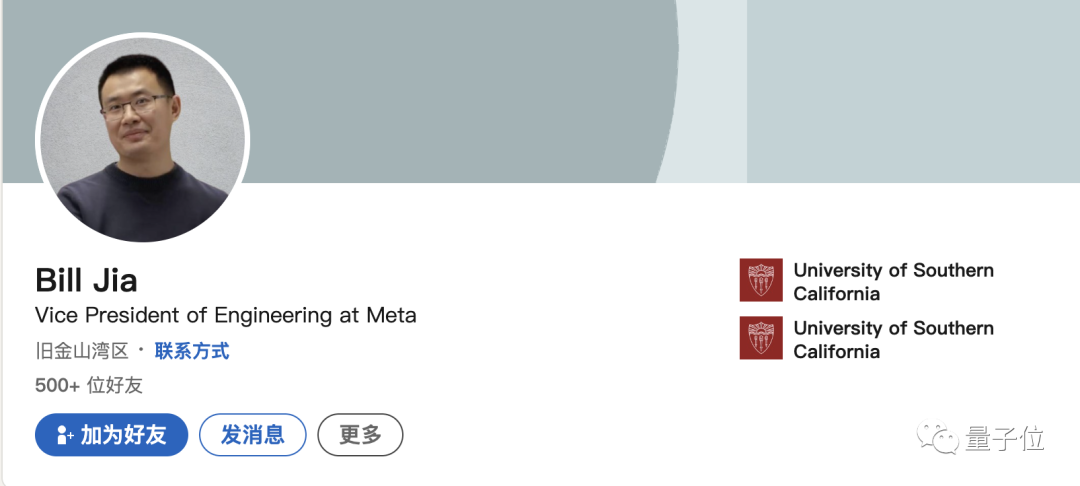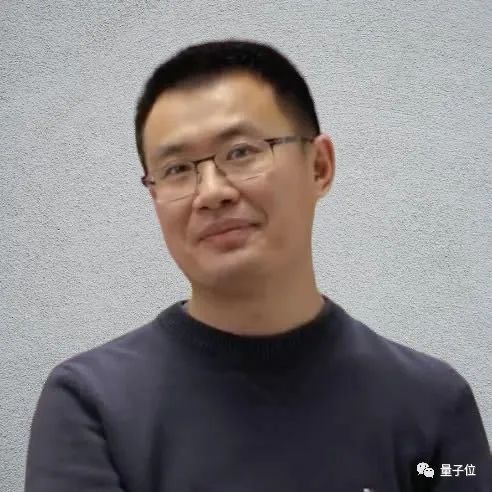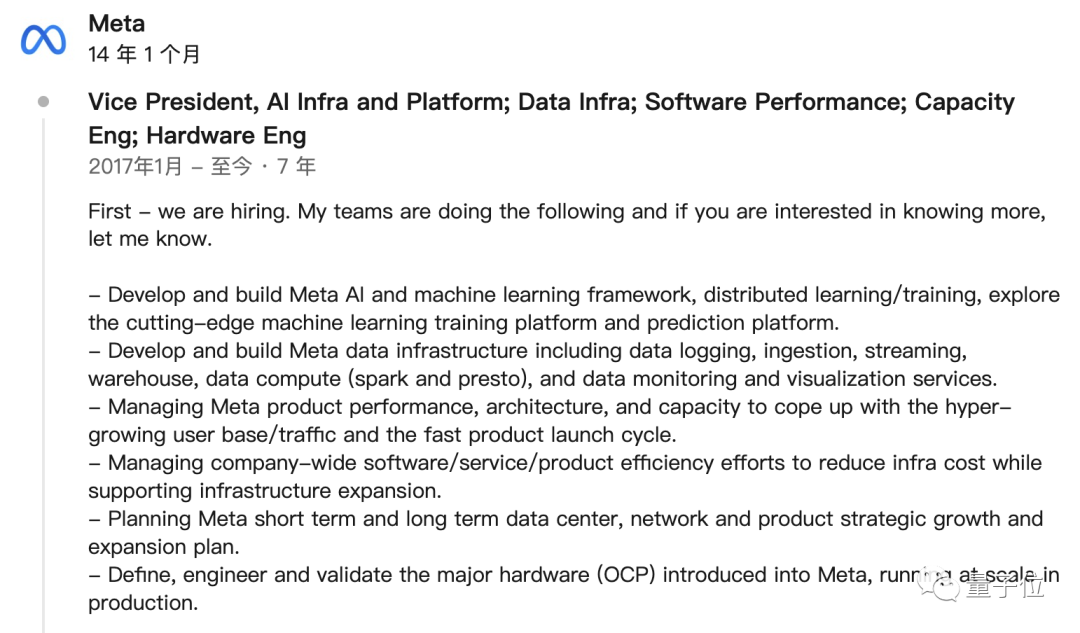Article Source: Quantum Bit

Image Source: Generated by Wujie AI
Apart from secretly preparing and unexpectedly releasing Gemini, what else is Google up to?
They are also restructuring the AI team internally and poaching executives externally, reshaping their competitive edge when their competitors make mistakes.
This is the latest scoop just obtained by Quantum Bit. It is said that Google first quietly shut down all AI-related departments, then reorganized a new department under the codename "Core AI". Even more significantly, Google also poached a leader to head Core AI from outside the company, a Chinese, currently the highest-ranking Chinese executive in Silicon Valley:
Bill Jia.
Yes, Meta's Bill Jia. Meta's Senior Vice President of Engineering, in charge of AI/ML infrastructure, data infrastructure, performance and capacity engineering, and hardware engineering. His most well-known achievement in the tech industry is PyTorch—currently one of the most popular AI frameworks.
And if we mention a Chinese executive and framework at Meta, you might think of Yangqing Jia, the author of Caffe who later jumped ship to Alibaba and became the Chief AI Scientist. During his time at Meta, Yangqing Jia reported to Bill Jia.

Who is Bill Jia?
Just last month, the "backyard fire" drama at OpenAI kept Silicon Valley and even Seattle on edge.
Microsoft CEO Nadella was praised for his various brilliant moves, while his Indian compatriot—Google CEO Pichai—was once ridiculed for sleeping soundly, unaware of the opportunity to poach talent during the chaos.
However, jokes aside, Google actually made a big move. Quantum Bit has learned that Google is internally undergoing organizational adjustments, consolidating the previously scattered AI forces and then bringing them together to form Core AI.
In addition, Google has found a leader for this new AI department: Bill Jia.
It is said that the reason Bill Jia ultimately chose Google is closely related to the internal strife at OpenAI. Quantum Bit has heard that since the surge of the new wave of AI, Bill Jia has become a "key target" for both small and large companies and high-end headhunters.
Star startups hope to bring him on board, and big companies also hope to recruit him—OpenAI is one of them, reportedly offering a high-level position.
But unexpectedly, Google took advantage of the chaos and successfully poached Bill.
Bill Jia, currently the Senior Vice President of Engineering at Meta, is in charge of Meta's AI/ML infrastructure, data infrastructure, performance and capacity engineering, and hardware engineering, and is also a framework guru, with PyTorch coming from his team. Yangqing Jia also reported to Bill Jia at Meta.
Bill Jia is also currently the highest-ranking Chinese executive in Silicon Valley, and one of the most powerful Chinese executives among global tech giants. However, he has been exceptionally low-key and has not completed his "breakthrough" outside the tech industry—until this "job change."

Public records show that Bill is an alumnus of Shanghai Jiao Tong University, where he obtained dual bachelor's degrees in industrial engineering and materials engineering, and later pursued a master's degree in distributed scheduling algorithms at National University of Singapore.
In 2003, Bill went to the United States for further studies and obtained a Ph.D. in Operations Research and Algorithm Design from the University of Southern California (USC) in 2007.
After completing his Ph.D., Bill spent four years at Microsoft.
During his time at Microsoft, Bill was mainly responsible for infrastructure optimization algorithms, including but not limited to:
- Developing and applying algorithms, statistical/mathematical optimization models to enhance system architecture, capabilities, and performance to support critical decision-making processes;
- Developing ML algorithms to predict user behavior/preferences, designing portal websites, and increasing user engagement, among other tasks.

At the end of 2009, Bill left Microsoft and joined Facebook (now Meta), where he served as an Engineering Manager/Director for the next 7 years.
At that time, Facebook had fewer than 1000 employees, having been founded for only 5 years, and its IPO was not until 2012.
Quantum Bit has learned that since taking up the position in 2009, Bill's main responsibilities were to develop the company's software product performance strategy and drive company optimization and infrastructure planning.
In January 2017, Bill was promoted to Vice President of Artificial Intelligence Infrastructure and Platforms at Facebook, essentially becoming the highest-ranking Chinese executive at Facebook.
During this period, his focus expanded to the development of cutting-edge AI/ML platforms and infrastructure, such as developing and building AI and ML frameworks, distributed learning/training, and exploring cutting-edge ML training and prediction platforms.
It is worth mentioning that the hugely influential PyTorch was created and expanded by Bill and his team.
Based on foundational components, Bill led and oversaw the development of Meta's infrastructure, including data logging, data ingestion, data streaming, data warehousing, data computation (spark and presto), data monitoring, and visualization services.
On the product side, Bill managed the performance, architecture, and capacity of the company's products to cope with the rapid growth of user traffic and the fast product release cycle. His other work also delved into a series of Meta's core products, such as search, advertising, news feed, photos, and videos.

In summary, since joining Meta, Bill has not only made significant contributions in algorithms but also led the definition of Meta's hardware platform and strategy.
To date, Bill's title is SVP of Meta—making him the highest-ranking Chinese executive in Silicon Valley tech companies.
Google Poaches Bill Jia to Lead Core AI
However, now—or at the latest by 2024—Bill Jia will join Google and embark on his new journey.
Quantum Bit has learned that news of his departure has already been announced internally at Meta, and his next destination is also basically confirmed: to serve as the head of Google Core AI.
His specific rank is not yet known, perhaps it will be made clear when Google officially announces it to the public.
Interestingly, Quantum Bit also found out that the news of Bill "possibly changing jobs" has been circulating since the surge of ChatGPT.
This is because there have been too many temptations and offers from outside.
Quantum Bit has confirmed from multiple sources that star model startups have tried to poach him with partner offers, big companies have offered sky-high contracts to recruit him, and OpenAI has also been in close contact.
But in the end, perhaps due to the "internal strife" incident, OpenAI lost the battle for this Chinese executive, and Google's victory is not just about winning over Bill Jia, but may also involve recruiting more AI engineers and scientists. The "internal strife" has shaken the confidence of external observers—what was once thought to be a solid foundation at OpenAI is now showing visible cracks, and there's no going back.
But speaking of Bill Jia, the most attention-grabbing aspect is what kind of changes he will bring to Google AI?
Before he officially takes office, perhaps we can look at his recent public remarks to see how he thinks about AI, which can be summarized into three key words.
First is open source.
He believes that in the AI model layer, open source has played a crucial role in the development of computer vision and language translation to their current mature state. Taking computer vision as an example,
CNN (Convolutional Neural Network) was open source from the beginning, and a series of subsequent models were also mostly open source, accelerating multiple rounds of innovation and technological iteration.
Open source large models are continuously forming an ecosystem, while also driving closed-source large models to upgrade to the next generation.
At the same time, open source large models provide more opportunities for developers in the ecosystem, "in the next 6 to 9 months, it is entirely possible to run relatively small-scale LLM on mobile devices."
Second is architecture.
Bill predicts that large models have the opportunity to introduce new model architectures that can understand the relationship between paragraphs, which will be an important milestone.
Third is temporal correlation.
Currently, large models mainly consider spatial correlation when processing input; future models will need to consider temporal correlation, "which is crucial for video generation and logic generation." He also emphasizes that this is currently a weakness of large models and requires urgent research and innovation.
So it can be inferred that when Bill Jia takes over at Google, if his personal AI thinking is continued at a strategic level by Google, then Google's counterattack against OpenAI may focus on open source architecture.
So, the first target to bear the brunt of this wave of Google's counterattack against OpenAI may be Meta, which has already launched LlaMA (manual dog head).
Hmm, if we look at it from this inference, if OpenAI is in chaos again, Google might as well prioritize poaching from Meta. Of course, there is also a joke that Google is not very interested in poaching talent from OpenAI, after all, most of OpenAI's talent has come from Google, and if they come back after less than a year, they will have to get a raise. Will Google's morale be greatly disrupted?
Since poaching from OpenAI is not profitable, then intercepting potential candidates from OpenAI and poaching the person in charge of Meta's AI infrastructure, which will be the key competitor in the future… killing two birds with one stone, it's perfect.
Of course, the above information is purely rumors confirmed by multiple sources in the industry. For Bill Jia's joining Google, please refer to his official announcement or the company's statement. And for the strategic thinking of Google AI to revitalize its strength, please refer to statements from Brin or Pichai (another manual dog head).
免责声明:本文章仅代表作者个人观点,不代表本平台的立场和观点。本文章仅供信息分享,不构成对任何人的任何投资建议。用户与作者之间的任何争议,与本平台无关。如网页中刊载的文章或图片涉及侵权,请提供相关的权利证明和身份证明发送邮件到support@aicoin.com,本平台相关工作人员将会进行核查。




